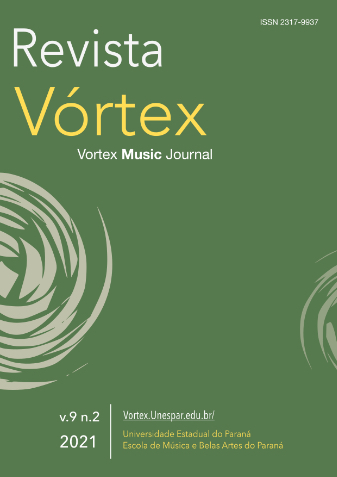What Pd Can't Teach; What It Can
DOI:
https://doi.org/10.33871/23179937.2021.9.2.13Keywords:
pedagogy, digital, analog, rationalization, statistical feedbackAbstract
Pure Data's long appeal is partly owed to its visual layout and intuitive mode of use. This might lead one to consider it a useful pedagogical tool, even if it now meets stiff competition from glitzier and more user-friendly applications. In the author's experience, however, Pd's ambiguous location on the spectrum of virtualization makes it bad for teaching but gives it a far more important function for composers. In occupying an uncanny valley between the digital-as-digital and the digital-as-analog, it resists the general tendency of digital technology to obscure awareness of itself, that is, of the digital computer as the current high watermark of a longer history of rationalization. It thus pushes composers of computer music back towards the questions that are at the heart of their work. This dynamic is illustrated by the author's experience of developing and tinkering with a novel technique of sound synthesis.Downloads
References
AMES, Charles. Thresholds of Confidence: An Analysis of Statistical Methods for Composition, Part 1: Theory. Leonardo Music Journal, Vol. 5, 1995, pp. 33-38
PUCKETTE, Miller. Max at Seventeen. Computer Music Journal. Volume 26, Issue 4. Winter, 2002. pp. 31-43.
PUCKETTE, Miller. Interview on Future of Coding (podcast), episode #47, Miller Puckette - Max/MSP and Pure Data. May 12th, 2020. <https://futureofcoding.org/episodes/047.html> last accessed, November 26, 2021.
GALLOWAY, Alexander. The Interface Effect. Polity Press, 2012.
GALLOWAY, Alexander. Laruelle: Against the Digital. University of Minnesota Press, 2014.
DELEUZE, Gilles; GUATTARI, Felix. A Thousand Plateaus: Capitalism and Schizophrenia. Continuum Press, 2004 (original publication of translation, 1988).
MATHEWS, M. V. The Digital Computer as a Musical Instrument. Science, New Series, Vol. 142, No. 3592, 1963, pp. 553-557.
POLANSKY, Larry; BARNETT, Alex; WINTER, Mike. A Few More Words About James Tenney: Dissonant Counterpoint and Statistical Feedback. Computer Music Journal, Volume 5, Issue 2, 2011, pp. 63-82.
Downloads
Published
How to Cite
Issue
Section
License
Copyright (c) 2021 Joshua Hudelson

This work is licensed under a Creative Commons Attribution 4.0 International License.
Autores mantêm os direitos autorais e concedem à revista o direito de primeira publicação, com o trabalho simultaneamente licenciado sob a Licença Creative Commons Attribution que permite o compartilhamento do trabalho com reconhecimento da autoria e publicação inicial nesta revista.






